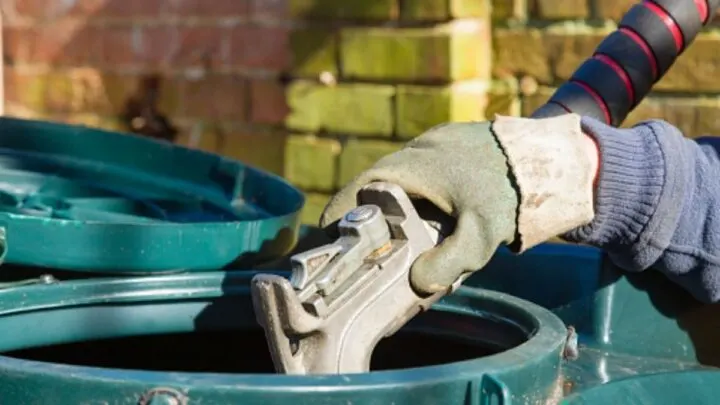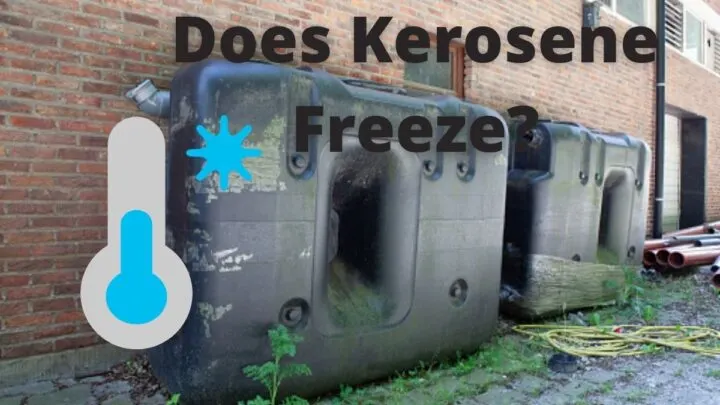Kerosene can be used for all sorts of things, so it’s common to have some out in the garage. But when winter comes around, does it freeze completely?
If you have any kerosene at your house or at the shop you own or work at, it’s important that it’s used and stored properly.
One of the biggest concerns that people have about storing kerosene and any other chemical is whether or not it can freeze.
And if it can freeze, at what temperature will that occur. So what about kerosene itself?
Kerosene does freeze, but it only does so in extremely frigid temperatures. The freezing point of standard kerosene is -40°F, and other grades of kerosene have even lower freezing points.
In this article, we will discuss whether or not kerosene freezes and what temperatures it begins to freeze at.
We will also talk about if there are any grades of kerosene that can be used at lower or higher temperatures.
Finally, we will answer the question of whether or not it’s bad to store kerosene outside in cold weather.
We’re working on creating your one-stop shop for everything related to kerosene, and this is just one of many articles we’ve written in this space. So read on to figure out if kerosene can freeze.
Does Kerosene Freeze at Low Temperatures?
As a substance usually only used for heating purposes, you don’t want to ever walk out to your shed or garage to grab the kerosene only to find a frozen hunk of it sitting at the bottom of the container.
With something we’re all more familiar with like gasoline, you don’t have to worry about that freezing until it gets down to around -100°F. But what about kerosene?
Kerosene’s freezing point is around -40°F.
That means if you’re using or storing kerosene in an unheated space and the temperature outside drops below that, there’s a chance your kerosene could freeze.

What Temperatures Do Different Grades of Kerosene Freeze At?
As noted, this is for standard kerosene or the type of kerosene that you’re most likely to find at the store.
However, there are other grades of kerosene that have different freezing points.
For example, there’s something called aviation kerosene which has a freezing point of -60°F.
If you live in a place with very cold winters, it might be worth looking into this type of kerosene, as it’s less likely to freeze than the standard kind.
Additionally, there is also kerosene that has been treated with additives to help prevent freezing.
This type of kerosene usually has a freezing point that’s around -100°F, which is the same as gasoline.
However, it’s important to note that this type of kerosene can be more expensive than the standard kind.
Can You Use Kerosene at Any Temperatures?
Since kerosene is most often used as heating oil to keep you warm during the winter, it would be nice if the fuel itself wasn’t susceptible to freezing.
After all, having a heating oil that froze at the temperatures that you actually need to start using it wouldn’t be very helpful.
Thankfully, you don’t have to worry about that with kerosene in most places in the world.
As mentioned above, standard kerosene has a freezing point of around -40°F. In most places in the world, this won’t become an issue.
Since this is the freezing point of kerosene, you can realistically expect to use it effectively until the temperature gets this cold.
But what about the other end of the spectrum? Is kerosene safe to use even during the hottest days of the year?
The answer to this is a resounding yes. In fact, kerosene can be used at just about any high temperature seen anywhere on Earth’s surface.
The real question here is what would you even be using kerosene for at these high temperatures?
But I guess that’s really up to you! In any case, rest assured that high temperatures are not the problem with using or storing kerosene.
Is it Bad to Store Kerosene Outside in the Winter?
Due to the temperature that kerosene begins to freeze at, you might be wondering if it’s bad to store kerosene outside during the winter.
After all, if the temperature is going to be freezing cold outside for extended periods of time, you don’t want your kerosene freezing and becoming unusable.
The good news is that as long as you have a way to keep your kerosene from freezing, storing it outside during the winter shouldn’t be an issue.
This means either keeping it in a heated space or getting a type of kerosene that is less likely to freeze (such as aviation kerosene).
At the very least, by keeping it inside and out of the wind and cold air, very few places in the US will experience temperatures low enough to freeze standard kerosene.
Of course, you could also just buy or use the treated kerosene that we talked about earlier.
As long as you’re using this type of kerosene, you shouldn’t have to worry about it freezing no matter how cold it gets outside.
Well, that might not be true, but having a freezing point as low as -100°F certainly helps to keep it from freezing!
Summing Up If Kerosene Freezes
So, yes, kerosene does freeze, but its freezing point is so cold that it will only ever truly freeze in very cold climates on the Earth’s surface. Otherwise, as long as you store it properly, you should be all set to use it whenever you might need it in the cooler (or warmer) months.
So there you have it! Does kerosene freeze? The answer is yes but only under specific conditions.
As long as you’re aware of these conditions and take the necessary precautions, you should be able to use/store kerosene without any issues.


